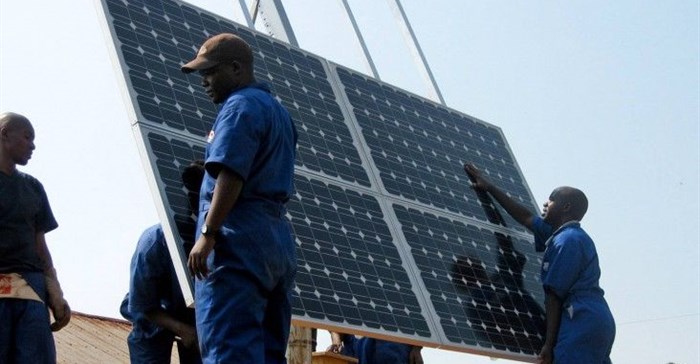If there's one thing Africa isn't short of it is sunshine. So, it's hardly surprising that solar is making a major impact on increasing the number of people on the continent who have access to power.

Training workers to properly install solar panels at health clinics in Rwanda provides clean energy and creates green jobs. Photo: Walt Ratterman, Sunepi
Sun energy is currently leading the race in renewables and for the first time solar photovoltaic (PV) additions surpassed all other fuels including coal. In its latest report on renewables, the International Energy Agency (IEA) estimated a continued strong solar PV growth through to 2022, with renewable electricity capacity forecast to expand by over 920GW, an increase of 43%. The amount of power from solar grew by more than 50%, and has officially increased energy output globally at a faster rate than any other fuel.
Tripled capacity by 2022
Solar PV is expected to contribute the largest annual capacity additions over the next five years, surpassing wind and hydro. The IEA report tracks off-grid PV applications in sub-Saharan Africa and developing Asia for the first time. According to the current curve, solar capacity is set to triple to over 3,000MW in 2022 in these regions, as a result of industrial applications, solar home systems (SHS), and mini-grids driven by government electrification programmes, and private sector investments.
The socio-economic impact will be significant, and over the next five years, SHSs – the most dynamic sector in the off-grid segment – are forecast to bring basic electricity services to almost 70-million more people in Asia and sub-Saharan Africa. It will also lead to new business players bringing innovative payment solutions that allow low-income populations initial access to electricity services.
East Africa leads the way
To date, East Africa has been a main initiator in off-grid solar systems. For example, in Rwanda a solar powered mobile kiosk charges phones and connects communities. Currently, the Tanzanian national grid supplies electricity to less than 20% of the population and in other areas of the country mini-grids are connected to oil-burning or hydroelectric plants. This amounts to only a quarter of Tanzanians having access to power, while only another 8% of majority rural dwellers receive continuous power from solar systems linked to lithium-ion batteries.
These private sector innovations supported by Power Africa and funded by OPIC (Overseas Private Investment Corporation) are enabling people to access power in increasingly shorter periods of time through off-grid energy solutions.
Populations who are not yet connected to the grid no longer have to wait months, years, or decades to have access to electricity for their homes and businesses. These innovative solutions are having an immediate and practical impact whereby millions of people in Africa will benefit by switching from kerosene and diesel fuels to solar energy, reducing their expenditures on energy while concomitantly and significantly reducing CO2 emissions.







































